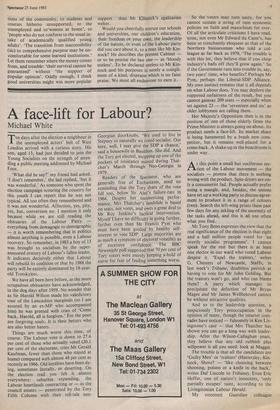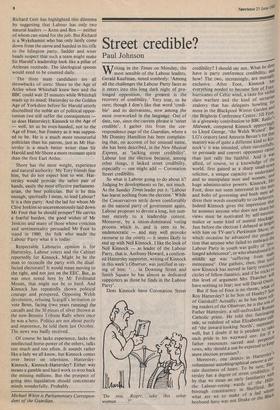A face-lift for Labour?
Michael White
Ten days after the election a neighbour in the unemployed actors' belt of West London arrived with a curious story. His son, aged 13, had just decided to join the Young Socialists on the strength of atten- ding a public meeting addressed by Michael Foot.
`What did he say?' my friend had asked. `I don't remember,' the lad replied, 'but it was wonderful.' As someone who spent the election campaign scouring the country for this youth I can report that he was not typical. All too often they remembered and it was not wonderful. Affection, yes, pity, yes, but, conversion no. I mention it only because while we are still reading the obituaries of the Labour Party everything from demagogic to demographic — it is worth remembering that in politics almost anything is possible, even a Labour recovery. So remember, in 1983 a boy of 13 was brought to socialism by the super- annuated oratory of Labour's fallen leader. It indicates decisively either that Labour will rebuild its coalition or that by 1988 the party will be entirely dominated by I 8-year- old Trotskyites.
We have all been here before, as the more scrupulous obituarists have acknowledged, in the dog days after 1959. No wonder that as Sir Harold Wilson made his valedictory tour of the Lancashire marginals (so 1 am assured by an ex-MP who accompanied him) he was greeted with cries of 'Come back, Harold, all is forgiven.' For the poor are forgiving souls. It is their betters who are also better haters.
Things are much worse this time, of course. The Labour vote is down to 27.6 per cent of those who actually voted (20.1 per cent of the electorate, cries Mr Gerald Kaufman, fewer than those who stayed at home) compared with almost 48 per cent as recently as 1966. Old loyalties have been dy- ing, sometimes literally, or deserting. On the election trail you felt it almost everywhere: suburbia expanding, the Labour heartlands contracting or — in the council estates — penetrated by the Tory Fifth Column with their tell-tale neo-
Georgian doorknobs. 'We used to live in Stepney so naturally we voted socialist. Out here, well, I may give the SDP a chance,' said a housewife in Basildon. She did. And the Tory got elected, mopping up one of the pockets of resistance missed during That- cher's March through Neo-Georgia in 1979.
Readers of the Spectator, who are generally free of Enthusiasm, need no reminding that the Tory share of the vote fell too, below Sir Alec's failure-rate in 1964. Despite her mesmerising perfor- mance, Mrs Thatcher's landslide is based on seats, not votes, and owes a great deal to Mr Roy Jenkins's tactical intervention. Myself I have no difficulty in going further, further even than Mr Francis Pym who must have been guided by healthy self- interest to vote SDP. Large majorities are as much a symptom of electoral volatility as of excessive confidence. The BBC Newsnight poll suggested that 70 per cent of Tory voters were merely keeping a-hold of nurse for fear of finding something worse.
So the voters may turn nasty, for you cannot sustain a string of rum economic policies on faith and masochism for ever. Of all the articulate criticisms I have read, none, not even Mr Edward du Cann's, has been so trenchantly eloquent as that of the Northern businessman who told a col- league as far back as 1979, 'The trouble is with this lot, they believe that if you chop industry's balls off they'll grow again.' So if the Government runs into trouble in, say, two years' time, who benefits? Perhaps Mr Pym, perhaps the Liberal-SDP Alliance. My own instinct remains that it all depends on what Labour does. You may deplore the supposed unfairness of the result, but you cannot gainsay 209 seats — especially when set against 23 — the 'seventeen and six' as older lobbymen are calling them.
Her Majesty's Opposition then is in the position of one of those elderly firms the Prime Minister is always going on about. Its product needs a face-lift. Its market share is being hammered by a brash new com- petitor, but it remains well-placed for a come-back. A shake-up in the boardroom is under way.
At this point a small but vociferous sec- tion of the Labour movement — the socialists — protest that there is nothing wrong with the product. Spin-dryers are on- ly a consumerist fad. People actually prefer using a mangle, and, besides, the unions have set up a working party to discuss agree- ment to produce it in a range of colours (two). Search the left-wing prints these past few days for any inkling of the enormity of the tasks ahead, and this is all too often what you find.
Mr Tony Benn expresses the view that the real significance of the election is that eight and a half million people voted for 'an overtly socialist programme'. I cannot speak for the rest but there is at least one elector in our ward who voted Labour despite it. 'Expel the traitors,' writes G. Chesters of Newcastle, Staffs, in last week's Tribune, doubtless peevish at having to vote for Mr John Golding. But the traitors won't go, and who can blame them? A party which manages to precipitate the defection of Mr Bryan Magee and Mr James Wellbeloved cannot be without attractive qualities.
And so to the leadership question, a suspiciously Tory preoccupation in the opinion of many, though the smarter com- rades have noticed — fulsomely in Ken Liv- ingstone's case — that Mrs Thatcher has shown you can go a long way with leader- ship. After the Wilson-Callaghan years, they believe that any old rubbish plus willpower is all you need: look at Maggie.
The trouble is that all the candidates are `Guilty Men' or 'traitors' (Hattersley, Kin- nock, Shore? — 'like choosing between shooting, poison or a knife in the back,' writes Daf Lincoln to Tribune). Even Eric Heffer, one of nature's innocents, 'only partially escapes' taint, according to the Livingstonian Labour Herald.
My esteemed Guardian colleague
Richard Gott has highlighted this dilemma by suggesting that Labour has only two natural leaders — Kenn and Ben — neither of whom can stand for the job. But Richard is a Wykehamist who has only lately come down from the sierra and handed in his rifle to the Islington party. Sadder and wiser heads suspect that such a team might make Sir Harold's leadership look like a pillar of Attleean rectitude. The ideological spoons would need to be counted daily.
The three main candidates are all throwbacks of sorts: Shore to the Age of Attlee when Whitehall knew best and the BBC could wait 25 minutes while Whitehall made up its mind; Hattersley to the Golden Age of Yorkshire before Sir Harold utterly discredited the noble art of political oppor- tunism (we still suffer the consequences so does Hattersley); Kinnock to the Age of — well, let us be even-handed, not to the Age of Foot, but Footery as it was suppos- ed to be. He is a much more resourceful politician than his patron, just as Mr Hat- tersley is a much better writer than Sir Harold and Mr Shore a more resonant spirit than the first Earl Attlee.
Shore has the most weight, experience and natural authority. My Tory friends fear him, but do not expect him to win. Hat- tersley would provide the safest pair of hands, easily the most effective parliament- arian, the best politician. But is he thin enough, spiritually I mean, to lead Labour? It is a thin party. And the lad for whom Mr Clive Jenkins so unceremoniously laid down Mr Foot that he should prosper? He carries a fearful burden, the good wishes of Mr Jenkins and many of those whose cynicism and sentimentality persuaded Mr Foot to stand in 1980, the folk who made the Labour Party what it is today.
Respectable Labourist opinion is for Hattersley, Labour voters and the Cabinet reportedly for Kinnock. Might he be the man to reconcile the party with the disaf- fected electorate? It would mean moving to the right, and not just on the EEC. But, as was once noted here by Mr Ferdinand Mount, that might not be so hard. And Kinnock has repeatedly shown political courage and prospered. Opposing Welsh devolution, refusing Scargill's invitation to vote Benn, facing (two years running) the catcalls and the 30 pieces of silver thrown at the now-Bennite Tribune Rally where once he was a hero. Politics are not about purity and impotence, he told them last October. The news was badly received.
Of course he lacks experience, lacks the intellectual horse-power of the others, talks too much and too often. It sounds rather like a lady we all know, but Kinnock comes over better on television. Hattersley- Kinnock, Kinnock-Hattersley? Either way means a gamble and hard work to woo back the missing millions. But the prospect of going into liquidation should concentrate minds wonderfully. Probably.
Michael White is Parliamentary Correspon- dent of the Guardian.



















































 Previous page
Previous page